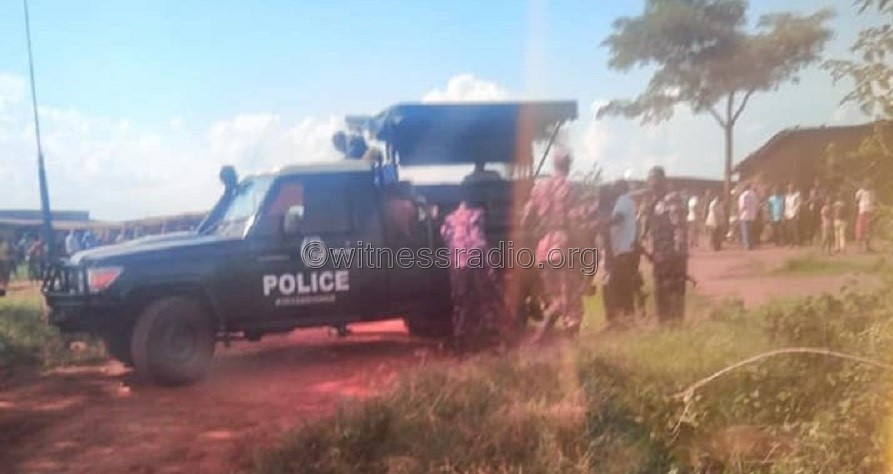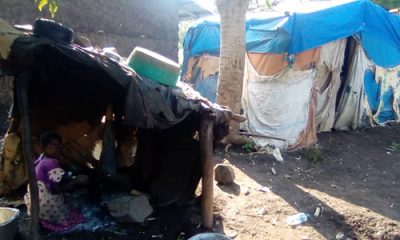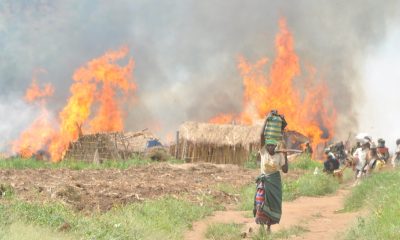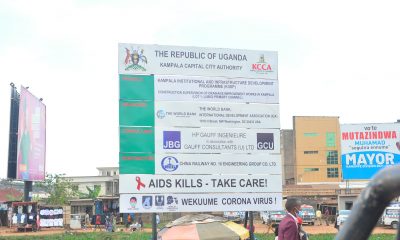By witnessradio.org Team
Joan Buryerali is one of the seven lawyers who were kidnapped during the COVID-19 lockdown in the Kiryandongo district. The basis for the lawyers’ physical interface with Project Affected Persons (PAPs) was to gather more evidence in the run-up to the numerous cases filed against multinationals at the Masindi High Court.
Since 2017, three multinational companies namely; Great Seasons SMC Limited, owned by a Sudanese investor based in Dubai, Kiryandongo Sugar Limited, belonging to one Mauritius family called RAI Dynasty, and Agilis Partners Limited run by American twin brothers (Benjamin Prinz and Phillip Prinz) that are illegally and forcefully evicting more than 35,000 people off their land.
In March 2020, the Government of Uganda issued a directive halting any land eviction during the COVID period. However, this was disregarded; illegal evictions and violations/abuses of human rights continued across the country. Kiryandongo was among the hard-hit districts. Kiryandongo district recorded the highest level of impunity from some powerful investors and security operatives.
In response to the numerous distress calls, a team of seven lawyers set out to collect real evidence from individual community members affected by large-scale agricultural projects. On 29th June 2020, they traveled 220 Kilometers Northwest of Kampala on a mission to address the increased violence meted against the local population.
The actual work started on 30th June 2020. The lawyers drove 45 minutes deep in villages to meet victim communities and work commenced at 0900 hours East Africa Standard time from the hotel.
According to Buryerali, COVID-19 Standard Operating Procedures (SOPs) were observed as each lawyer had to keep a distance from each other and 6 meters with the victim being interviewed.
At around 15:00 hours, anti-riot police attached to Kiryandongo district police under the command of ASP Joseph Bakaleke arbitrarily rounded and forcefully arrested all the lawyers plus the seven (7) victim members that were being interviewed. Police bundled them on a police patrol and another private numbered double cabin vehicle, which was later discovered to be driven by one of the Agilis Partners’ managers.
Below is Joan’s ordeal on the day of the arbitrary arrest and detention;
“We were ordered to stop whatever we were doing and jump onto police vehicles. When we tried to ask for reasons behind our kidnap, the Kiryandongo district Deputy Head of Criminal Investigation Department D/OCCID) Nyakaisiki Beatrice told us it was an order from above. She added that the DPC wanted us at Kiryadongo central police station. At that point, we had no choice but surrender ourselves to the gun wielding police officers who took us to the station.
On reaching there, neither was the District Police Commander (DPC) nor the Resident District Commissioner (President’s representative at the district) in office. There was one Ochenge Ismael, (Officer-in-charge of police unit administration) who stood in for the DPC. We tried to explain the essence of our work but our efforts were futile; the intention was to intimidate and have us detained. The sole purpose for this was to instill fear in us so that we abandon the eviction case.
The police officers had been bribed by these multinational companies to humiliate us before the people we were helping. Subsequent to failure to provide answers, the officer in charge ordered us to remove our shoes, enter the police cells, and wait for the DPC who later showed up the following morning.
While at the station, we kept on asking what crimes we had committed to whoever cared to listen. The D/OC CID insisted that it was an order from above.
After like three minutes another police officer came and commanded our team leader to move out. The same police officer returned and told us to vacant his office since it was time for official closure.
When we moved out, we found other police officers degrading and lifting our team leader by his trousers, yet he was calm. Irked by their inhumane treatment, we asked the police officers to stop harassing him. Our verbal exchange with the police escalated and they threatened to beat us. We were again told to remove shoes and leave our belongings at the police reception. We objected because we could no longer trust them. We instead handed over the items to our driver who would later transferred them to the hotel where we had previously spent the night. That evening, we were separated. The female lawyers were put in a congested cell separate from the one designated for men.
The police cell was very horrible! The foul smell was unbearable. The walls and floor were a mess. There was no cleaner space for any of us to scramble. The stench coming from the toilet was sickening if not stomach-turning! The filthy mattresses emitted urinal and faecal stench. The blankets were equally soiled. They had taken ages unwashed. The disturbing atmosphere kept us awake. At different intervals, each of us planted our nostrils on some big hole on the door to catch some fresh air. Kiryandongo police cell was not fit for human habitant. It was unhealthy for human beings to be there. Worst of all you were told to remove our shoes and move barefoot on such a dirty floor. Every single time I think about how dirty the cell was I feel disgusted. We even failed to eat have dinner. We surrendered our share to the women inmates. There was no way one could comfortably eat something in such a dirty place.
We could not use the sanitary facilities inside the cells. The women we found there had infections as a result of the dirty toilets. We instead accessed the outside facilities barefoot. To our dismay, they were also unclean. The following day, as we left the cell I could not touch my soiled and pathetic feet.
At about 9:00 am, Bakaleke Joseph, the then DPC showed up and we were released on bond. However, what saddened my heart was that the police officers knew that we had not committed any crime but detained us to sabotage our work.
At first, we were released without being charged. But for fear of being questioned, they arrested us again. This time we were charged with the offenses of conducting an unlawful assembly and spreading an infectious disease. These offenses were all false and fabricated. We had followed all COVID rules to the letter. Instead, the anti riot police flouted the rules by not wearing masks during the arbitrary arrest.
Immediately after our release, I imagined how our clients had lost faith in us. I felt harassed and belittled in front of the people I was supporting to get justice. Kiryandongo police painted a picture that they were superior and that the PAPs have nowhere to run to for any immediate assistance.
I have a dented professional because of the arbitrary arrest. I am being viewed as a chaotic person if not a criminal. This is because most people think that police only arrest offenders of the law. I no longer have a clear criminal record in the eyes of the public.
Why Criminalization?
Criminalization may be defined as the use of legal framework strategies targeting HRDs to illegitimate the work of HRDs. Its ultimate aim is to attack HRDs and/or impede their work. The criminalization of human rights defenders’ work through the misuse of criminal law involves the manipulation of the state’s punitive power by state and non-state actors to hinder their work in defense and thus prevent the legitimate exercise of their right to defend human rights
Criminalizing Human rights defenders’ work may lead to stigmatizations and delegitimization which affects the honor and public reputation of HRDs. Many analysts argue that stigmatization is part of the criminalization process. The explanation of why delegitimization, stigmatization, and other forms of disparagement are sometimes equated with criminalization may lie in the fact that they may precede, or occur in parallel to, criminalization processes and that the aim in both cases appears to be to damage the public image of the HRDs so targeted.
“Speaking on behalf of the seven lawyers that were arbitrarily arrested and detained in Kiryandongo during COVID 19 lock-down, the actions of police tarnished our names. A mark was left on our reputation whereby some people in the society see us as chaotic and criminal individuals. Once you’re profiled and your name enters that criminal book, some officials may conclude that you no longer have a clear record.” Said Joan Buryerali
Effects of Criminalization of a PAPs’ lawyer?
There could be more effects to the use criminalize the work of a defense lawyer but, the immediate one is stigmatization. In other words, stigmatization and delegitimization should be considered as causes and/or consequences of criminalization. Criminalization involves the use of criminal charges to attack the work of human rights defenders. It may also be organized in such a way that it questions the personal or professional integrity of the HRDs it targets.
“Some Law firms and Organizations would not want to work with someone who does not have a clean record. They may hesitate to employ you thinking you will become a problem to them. This limits my working opportunities.” Said Bulyerali.
Criminalization may cause a financial burden on the victim HRD. Upon being released either on police bond or court bail, HRDs are required to report back (travel 440 Kilometers on every reporting) until a matter is heard and disposed of. Also, HRDs are forced to hire a lawyer to defend themselves.
Most importantly, criminalization is time-consuming and can ably cause physiological torture. Kampala where I am based and Kiryandongo district, these two places are distant from the other when reporting on police bond or court bail, you need two days on every reporting.
Criminalization has restricted my freedom of expression;
Restrictions on the freedom of expression are aimed at causing generalized fear, intimidating and silencing the denunciations, claims, and grievances of the victims of human rights violations, spurring on impunity, and impeding the full realization of the rule of law and democracy. For stance in Kiryandongo district several lawyers and many community land right defenders, some of them include Stella Akitenge, Atyaluk David Richard, Olupot James, Benon Baryaija and many others have been subjected to inhuman and degrading treatment or tortured, just because they are helping victim communities to mobilize, resist and push back such illegal evictions.
Using the restrictive legal framework to criminalize my work.
Some laws such as the Public Order Management Act, 2013 (POMA), Non-Governmental Organizations Act, 2016, the Anti-Terrorism Act, and the Financial Intelligence Act, have been used by some duty bearers to restrict the extent of work/ operations of HRDs.
In 2013, the POMA was passed to regulate freedom of assembly and ultimately the freedom of association. As seen above, the POMA is often cited by duty bearers to restrict civil society space. The law as it currently stands imposes conditions on holding public gatherings and demonstrations and criminalizes meetings held in contravention of section 5 of the POMA.
The police have on many occasions said that we did not ask for permission before conducting a meeting and they break it up. And yet the POMA only mentions giving notification to the authorized officer if the meeting falls within those regulated by the POMA.
Regarding the seven lawyers that were arrested in Kiryandongo by police, it hind behind POMA to detain the lawyers in cells for the whole night with an aim of not wanting them to proceed with their work and intimidate them. These arrests meanwhile are just to scare them trying to instill fear in them that in case they proceed with their work, they will be dealt with.
Conclusion
In many aspects as already demonstrated above, the COVID-19 period in Uganda presented difficulties and effects on the work of HRDs particularly lawyers for the PAPs, which projects a dark future. The challenging situation shared in this article should be used as a precursor to reflect and discuss the best environment for all defenders to do their work.


 MEDIA FOR CHANGE NETWORK2 weeks ago
MEDIA FOR CHANGE NETWORK2 weeks ago
 MEDIA FOR CHANGE NETWORK3 days ago
MEDIA FOR CHANGE NETWORK3 days ago
 MEDIA FOR CHANGE NETWORK2 weeks ago
MEDIA FOR CHANGE NETWORK2 weeks ago
 MEDIA FOR CHANGE NETWORK2 weeks ago
MEDIA FOR CHANGE NETWORK2 weeks ago
 MEDIA FOR CHANGE NETWORK20 hours ago
MEDIA FOR CHANGE NETWORK20 hours ago
 NGO WORK2 weeks ago
NGO WORK2 weeks ago
 FARM NEWS2 days ago
FARM NEWS2 days ago





































